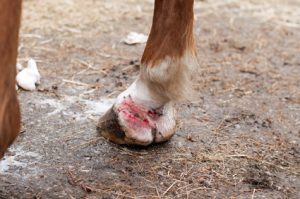Barn flies and how they cause summer sores in Equine and major headaches for barns.

For the South, last year’s mild winter, with an early and warmer spring was both a blessing and a curse.
It was a blessing because neither you nor your horses had to suffer a cold, rough winter. The early spring saved you additional hay costs. Plus, the pleasant weather has encouraged more riding and overall equine activity.
It was a curse because the mild winter temperatures also vastly increased the number of flies, ticks and related equine parasites in and around your barn.
One of the most challenging of these issues is summer sores.
“Summer sores” is a term for a skin condition in horses. Some of these lesions are caused by the larvae of the Habronema worm.
The normal cycle of the Habronema worm starts when they lay eggs in the horse’s stomach and the eggs are past in the manure and into the environment. These developing eggs are ingested by the larvae of various types of barn and house flies. The flies are both incubators and carriers, allowing the worm’s eggs to develop and grow. When these infected flies land near a horse’s mouth, the larvae are released and swallowed by the horse, completing the life cycle.
Summer sores develop when the stomach worm larvae are released into cuts or on irritated skin. This is a major wrong turn in the life cycle of the Habronema worm. These larvae cannot grow into adults now and are constantly trying to get to the stomach by burrowing through tissue and skin. This action induces localized swelling, ulceration, redness and itching and the lesions tend to grow rapidly and can be very painful.
The first step in dealing with the problem is to have your horse’s veterinarian examine the skin lesion and to make a diagnosis.
The second step is to get your barn fly population under control. If there are no flies the worms, with proper treatment, will die out. There will be no summer sores and you will once again be happy for a mild winter.
For more tips or questions contact Brad The Bugman at brad@marchbiological.com or call 800.328.9140.
